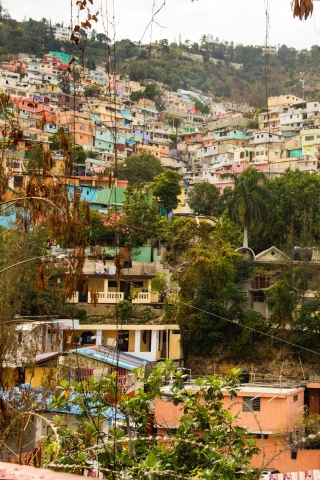
A rural community in Haiti asks U.S. groups to work to stop the flow of illegal guns into their country as they deal with spiraling gang violence and hunger. The following article was published in the January-February 2024 issue of NewsNotes.
On Christmas Day, the U.S. Embassy in Haiti went into lockdown when the embassy buildings and residential compound were surrounded by heavy gunfire. “All Embassy personnel have been instructed to remain indoors and shelter-in-place until further notice. All others should avoid the area,” the security alert said.
The embassy issued a similar warning for residents of another area of the capital city of Port-au-Prince three weeks earlier, when heavy gunfire took over the streets there.
It has been six months since the U.S. Embassy issued a statement urging U.S. citizens to leave the country due to the “armed clashes between gangs and the police and the high threat of violent crime and kidnapping throughout Port-au-Prince.” And it has been two and half years since the assassination of Haitian president Jovenel Moïse. In all this time the United States has done very little to slowdown the flow of illegal weapons from the United States into Haiti, or rebuild a functioning government to uphold the rule of law.
A UN report released on Nov. 28 said gang violence has escalated and spread from the capital city of Port-au-Prince to the rural areas with a significant increase in kidnappings and killings.
Maryknoll lay missioners live in the northern rural community of Gros Morne, home to about 7,000 people in Artibonite Department. The missioners work with community groups that provide regular updates to the Quixote Center, a U.S.-based social justice advocacy organization. The following is an excerpt of Quixote Center’s report on their December meeting with the Gros Morne community.
The community representatives began by naming sources of hope, the Quixote Center said. “They are especially happy that in Artibonite the schools are open this year, and on time. Also, they are noticing small local markets popping up, because people can no longer travel long distances to buy and sell,” due to gang control of key roads.
“Gros Morne itself is in a kind of bubble with respect to the gangs,” the Quixote Center reported. “Although there is gang activity all around them, the gangs have not invaded Gros Morne proper. But people live with the fear that it could happen any time. Because the gangs control the roads, many fewer people travel into Gros Morne. Life is continuing, but with increased isolation.”
The community also named food security as a serious concern.
“Hunger has increased throughout the country as a result of the border closure with the Dominican Republic. The closure has led to inflation and food shortages. Many people simply do not have food.”
Representatives of a local agriculture center told the Quixote Center that they have less produce to sell or distribute in the community because of people illicitly harvesting the gardens.
The UN report names sending in a multinational security force as the only solution to Haiti’s gang violence. But the Quixote Center says the Gros Morne community has named “advocacy work in the U.S. to diminish the gangs’ power, funding, and access to weapons” as a source of their hope. Another UN report exposed a network of criminal actors who purchase weapons in U.S. states with weak gun laws and smuggle them out of Florida and into Haiti.
Six U.S. senators asked President Biden what he plans to do to stop the flow of weapons from the U.S. into Haiti in a letter sent to the White House on Dec. 19. Led by Ed Markey of Massachusetts and Rev. Raphael Warnock of Georgia, the senators, all Democrats, expressed serious concerns about illegal weapons entering the country, humanitarian needs, and the lack of progress made by Haiti in establishing a democratically elected government.
In their letter to President Biden, the lawmakers requested answers to four questions:
- What is the U.S. government’s assessment of its efforts to rely on Prime Minister Ariel Henry to stabilize Haiti and organize elections? When does the U.S. expect elections to take place?
- Will you commit to reengaging with the civil society-led process for creating a transitional government in Haiti, without granting Ariel Henry or [Haitian political party] PHTK a de facto veto over a new transitional government?
- Will you commit to moving forward with targeted Global Magnitsky Act sanctions on Haitian elites and officials responsible for colluding with violent gangs and engaging in significant acts of corruption, including relevant leaders of PHTK?
- What additional steps will you take to stop the flow of heavy weapons and ammunition into Haiti from the U.S. and through the Dominican Republic?
Faith in action
Tell Congress to stop the flow of illegal guns to Haiti https://mogc.info/Haiti-Day-of-Peace
Photo by Robin Canfield on Unsplash.
